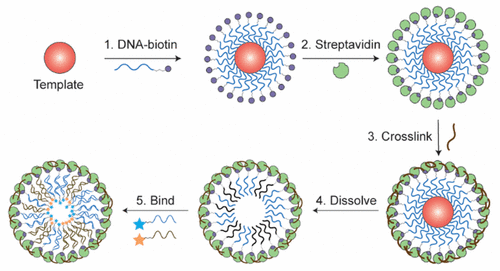当前位置:
X-MOL 学术
›
J. Am. Chem. Soc.
›
论文详情
Our official English website, www.x-mol.net, welcomes your feedback! (Note: you will need to create a separate account there.)
DNA-Controlled Encapsulation of Small Molecules in Protein Nanoparticles
Journal of the American Chemical Society ( IF 15.0 ) Pub Date : 2020-10-06 , DOI: 10.1021/jacs.0c09914 Wayne Ngo 1, 2 , Benjamin Stordy 1, 2 , James Lazarovits 1, 2 , Erum K. Raja 3 , Chris L. Etienne 3 , Warren C. W. Chan 1, 2, 4, 5, 6
Journal of the American Chemical Society ( IF 15.0 ) Pub Date : 2020-10-06 , DOI: 10.1021/jacs.0c09914 Wayne Ngo 1, 2 , Benjamin Stordy 1, 2 , James Lazarovits 1, 2 , Erum K. Raja 3 , Chris L. Etienne 3 , Warren C. W. Chan 1, 2, 4, 5, 6
Affiliation

|
A nanoparticle can hold multiple types of therapeutic and imaging agents for disease treatment and diagnosis. However, controlling the storage of molecules in nanoparticles is challenging, because nonspecific intermolecular interactions are used for encapsulation. Here, we used specific DNA interactions to store molecules in nanoparticles. We made nanoparticles containing DNA anchors to capture DNA-conjugated small molecules. By changing the sequences and stoichiometry of DNA anchors, we can control the amount and ratio of molecules with different chemical properties in the nanoparticles. We modified the cytotoxicity of our nanoparticles to cancer cells by changing the ratio of encapsulated drugs (mertansine and doxorubicin). Specifically controlling the storage of multiple types of molecules allows us to optimize the properties of combination drug and imaging nanoparticles.
中文翻译:

蛋白质纳米颗粒中小分子的 DNA 控制封装
一个纳米粒子可以容纳多种类型的治疗剂和显像剂,用于疾病治疗和诊断。然而,控制纳米颗粒中分子的存储具有挑战性,因为非特异性分子间相互作用用于封装。在这里,我们使用特定的 DNA 相互作用将分子存储在纳米粒子中。我们制造了含有 DNA 锚的纳米颗粒来捕获与 DNA 结合的小分子。通过改变 DNA 锚的序列和化学计量,我们可以控制纳米粒子中具有不同化学性质的分子的数量和比例。我们通过改变封装药物(mertansine 和阿霉素)的比例来改变纳米颗粒对癌细胞的细胞毒性。
更新日期:2020-10-06
中文翻译:

蛋白质纳米颗粒中小分子的 DNA 控制封装
一个纳米粒子可以容纳多种类型的治疗剂和显像剂,用于疾病治疗和诊断。然而,控制纳米颗粒中分子的存储具有挑战性,因为非特异性分子间相互作用用于封装。在这里,我们使用特定的 DNA 相互作用将分子存储在纳米粒子中。我们制造了含有 DNA 锚的纳米颗粒来捕获与 DNA 结合的小分子。通过改变 DNA 锚的序列和化学计量,我们可以控制纳米粒子中具有不同化学性质的分子的数量和比例。我们通过改变封装药物(mertansine 和阿霉素)的比例来改变纳米颗粒对癌细胞的细胞毒性。


























 京公网安备 11010802027423号
京公网安备 11010802027423号